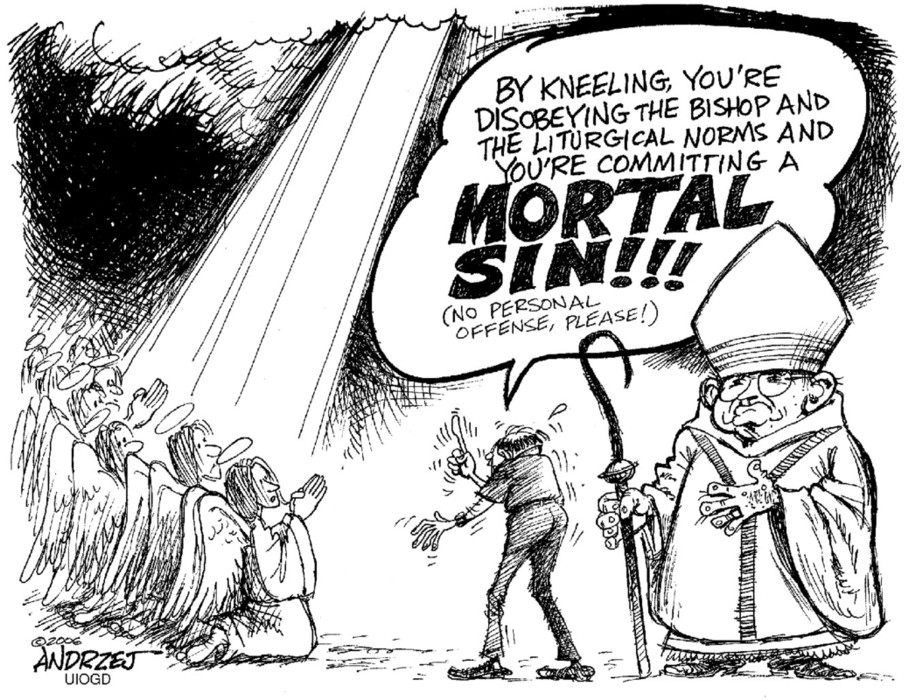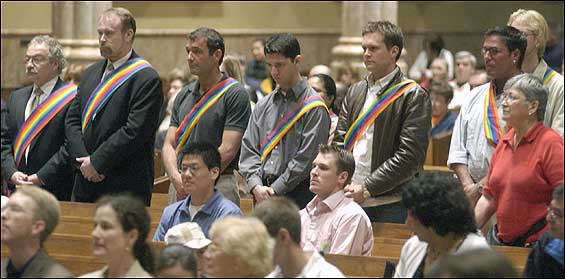The news hit the blogosphere last night. With a vote of 173 to 29, the American bishops voted overwhelmingly to approve the revised English translation of the Order of Mass. Sometime before the end of the decade, Catholics of the Roman Rite will, upon hearing the priest say, "The Lord be with you," will respond with the literal version of the original Latin, "And with your spirit," as well they should. In addition,
"[t]he new translation alters the wording of key texts spoken by Catholics during worship, including the Nicene Creed, the Gloria, the Penitential Rite, the Sanctus and Communion."And that's just the beginning.
Rome has long been concerned over the lack of fidelity to the Latin text, at times to the detriment of the meaning of the text, and theological clarity. This is not inconsequential.
"Lex orandi, lex credendi." "The law of praying is the law of believing." We pray what we believe. It is precisely what we believe -- as opposed to how many parish committees we join -- that makes us Catholic. This is far from a luxury at a time when the bishops are still considering a response to the sex abuse scandals, inasmuch as clarity of belief can include our recognizing grave sin when we see it. Can anyone argue that we have?
This weblog went into some detail on the revised texts in a series last fall entitled "Critical Mass: Lost (and Found) in Translation," with
Part I and
Part II.
The reaction from the progressive academic community has not been reassuring. Jesuit Father Thomas Reese, senior fellow at the Woodstock Theological Center at Georgetown University, has been quoted by the AP and CNN, as saying that the new translation would "cause chaos and real problems and the people who are going to be at the brunt end of it are the poor priests in the parishes."
We'll get back to that later.
Similar reservations have been expressed by some bishops themselves, who have been directed by Rome to adhere to the norms of the 2001 instruction
Liturgiam authenticam throughout the process. For example, in the proposed text for the Nicene Creed, "one in being with the Father" was to be replaced by "consubstantial with the Father," a more precise term which Bishop Trautman of Erie, as chairman of the bishops' liturgy committee, didn't think you poor illiterate slobs could handle. So the word was tossed out in the final vote, albeit subject to approval by Rome. (See the concluding portion of Part II above, for an analysis that even
this poor illiterate slob could figure out.)
A casual glance might seem to justify a concern with the adjustment Catholics would have to make, after living with the current translation for nearly forty years --
until you consider what the detractors are not telling you.(Okay, kids, this is the part you won't get anywhere else at St Blog's.)
The revising of the many liturgical texts of the reformed Latin rite, whether the Breviary or the Book of Blessings, as well as the translations into the various languages, has been continual since the Second Vatican Council. The process of re-translating the official English text of the Roman Missal began roughly a quarter of a century ago. In my library are reports from the International Committee on English in the Liturgy (ICEL) that most priests would never get to see, so this writer has been following this for awhile.
And I'm not alone. In 1992,
Catholic World Report began reporting regularly on concerns related to this process, and later in the decade, the
Adoremus Bulletin continued to go into depth. At the time, the changes being considered by progressive liturgists and translators, in the case of the generic "Ordinary of the Mass," were even more radical than what was voted on this past week. This included the employment of "inclusive language," not only in the case of the "horizontal" (references to people), but the "vertical" (references to God and/or Christ) as well. In addition to some standard texts, ICEL wanted to employ additional "alternate texts" that had no Latin originals, presumedly to "adapt" to the specific needs of the English-speaking world -- if not what some critics would have considered the creative whims of the translators.
An example of the "creative" that was considered during the mid-1990s, was the plan for the Introductory Rite of the Mass, which would have reorganized the various options as they now stand, into a system of five different scenarios -- to name two, not just the Kyrie without the Gloria, but depending on the occasion, the Gloria without the Kyrie. The result would have been a complete departure from the Roman Rite, beyond even that of the officially reformed texts.
Among those intrigued by the creative possiblities back then, is a priest who's complaining about the results now. In the early 1990s, I was on the staff of a Jesuit parish in Georgetown as a sacristan. In this capacity, I had the honor to serve many of the Jesuit Fathers in the Georgetown community, including Father Reese. I remember him as a popular and engaging individual, especially with the young adult crowd. I daresay the good Father was not above introducing certain adaptations into the Mass in their proposal stage, such as the alternatives to "Let us proclaim the mystery of faith" after the Consecration. With the prospect of a different introduction for each of the four in the English translation (like they already use in Canada, don't ask me why), at least you can tell them apart. Now if so many priests have their own way of doing this or saying that, aren't people already used to "winging it" to some degree on a Sunday morning?
Then there are the time-honored hymns which succumb to constant updating, including the purging of male pronouns, with the release of every new service book on the market. In the case of annual hymnals, that's potentially... you guessed it, annually. This last issue has been the subject of an excellent article in
Touchstone magazine by Anthony Esolen entitled
"No More Hims of Praise."The upshot is, we've all had four decades to get used to the liturgical intelligensia re-inventing the wheel!
So now, the same forces that are whining about the adjustment of the faithful to eighth-grade-reading-level phrases like "Make holy these gifts, we pray, by the dew of your spirit" (from the proposed epiclesis of Eucharistic Prayer II), thought absolutely nothing of even wreaking more havoc themselves, and doing it more often over time. What stopped them in their tracks?
At one time, the norms of a 1969 Vatican document, known by the French name
Comme le prevoit, served as a guide to translations, employing a convention known as "dynamic equivalency," which is basically a deference to the overall meaning of a particular text, as opposed to a slavish line-by-line translation at the expense of the unique qualities of the language in question. In the last decade, the Congregation for the Doctrine of the Faith (once known as the Holy Office) has reasserted its oversight responsibilities in the matter of official liturgical texts, working in relation to the Congregation for Divine Worship. This was inspired in part by a proposed English re-translation of the Rite of Ordination that was deemed completely unacceptable by the Holy See. (The head of the former Holy Office at that time was Joseph Cardinal Ratzinger, now Pope Benedict XVI.) Then Rome called for an overhaul of ICEL, and created its own body, known as "Vox Clara," assigned with specific oversight of the process of vernacular liturgical texts. Then the late Pope John Paul II released
Liturgiam authenticam, which called for, among other things, fidelity to the Latin texts as a matter of theological clarity.
True, the result of this effort will not be the language of normal conversation. But since when do we apply a pedestrian vocabulary to every situation? We use "courtly" language for all manner of formal occasions -- for the courtroom, for college graduation, and so on. Is the Banquet of the Lord's Supper to be reduced to a stop at the all-night diner? One should hope not. Such was the message of the Right Reverend Arthur Roche, Bishop of Leeds and Chairman of ICEL, who addressed the bishops this week on this very issue, among others: "Let me take one example, the use of the word
dew in the Epiclesis of the Second Eucharistic Prayer... It has been objected that this translation 'does not resonate or communicate with contemporary Christians.' But surely,
dew still exists. I noticed an advert on the street yesterday for a drink called Mountain Dew!
Dew has a unique set of natural and scriptural associations: it speaks of freshness, new beginning, water (and hence life), beauty, descent from above (and hence divine blessing), and manna (Exodus 16:13-14) (and hence Eucharist). It still appears on the ground in the morning as it did in the time of Moses on the journey through the desert. American people know what
dew is - rather better, I suspect, than Europeans, since so many of you get out of bed earlier than we do!"
(You can read Bishop Roche's
entire address, or the
bullet points from Doxaweb at
The Weight of Glory.)
The concern of liturgical progressives for the sensibilities of the faithful, then, would seem less than forthright. They themselves were prepared to go to greater lengths, and with less deliberation than has been shown of late. But with Rome stepping into the process to ensure that the
lex orandi is in sync with the
lex credendi, the party is over, and they're just plain sore about it.
Down at the race track, it's known as "backing the wrong horse."


